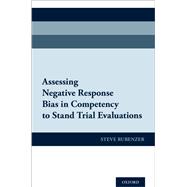Assessing Negative Response Bias in Competency to Stand Trial Evaluations
, by Rubenzer, Steven J.- ISBN: 9780190653163 | 0190653167
- Cover: Paperback
- Copyright: 4/19/2018
Evaluations of a defendant's competence to stand trial (CST) are probably the most frequently performed forensic evaluations, with estimates in the United States ranging from 60,000 to 70,000 annually. In order for CST evaluations to be considered thorough and accurate, examiners must assess for possible lack of cooperation, feigning, or malingering - the intentional production or gross exaggeration of false or grossly exaggerated physical or psychiatric symptoms, motivated by external incentives. Yet, there are accounts that CST examiners often do not assess for negative response bias, and even if they do nevertheless fail to identify a considerable number of examinees that do feign.
Assessing Negative Response Bias in Competency to Stand Trial Evaluations provides readers with a comprehensive guide to assessing whether a defendant has feigned mental impairment during a competency to stand trial evaluation, or simply did not put forth his/her best effort. This book reviews the literature on assessing feigning and negative response bias, with particular focus on issues, tests, and data relevant to CST evaluations, and examines proposed criteria and statistical methods of determining and classifying assessment results. It introduces readers to aspects of the vibrant neuropsychological response style literature, an area many forensic psychologists appear to have overlooked. Additionally, it offers recommendations for research and policy regarding the parameters of CST assessment.
Assessing Negative Response Bias in Competency to Stand Trial Evaluations provides readers with a comprehensive guide to assessing whether a defendant has feigned mental impairment during a competency to stand trial evaluation, or simply did not put forth his/her best effort. This book reviews the literature on assessing feigning and negative response bias, with particular focus on issues, tests, and data relevant to CST evaluations, and examines proposed criteria and statistical methods of determining and classifying assessment results. It introduces readers to aspects of the vibrant neuropsychological response style literature, an area many forensic psychologists appear to have overlooked. Additionally, it offers recommendations for research and policy regarding the parameters of CST assessment.






